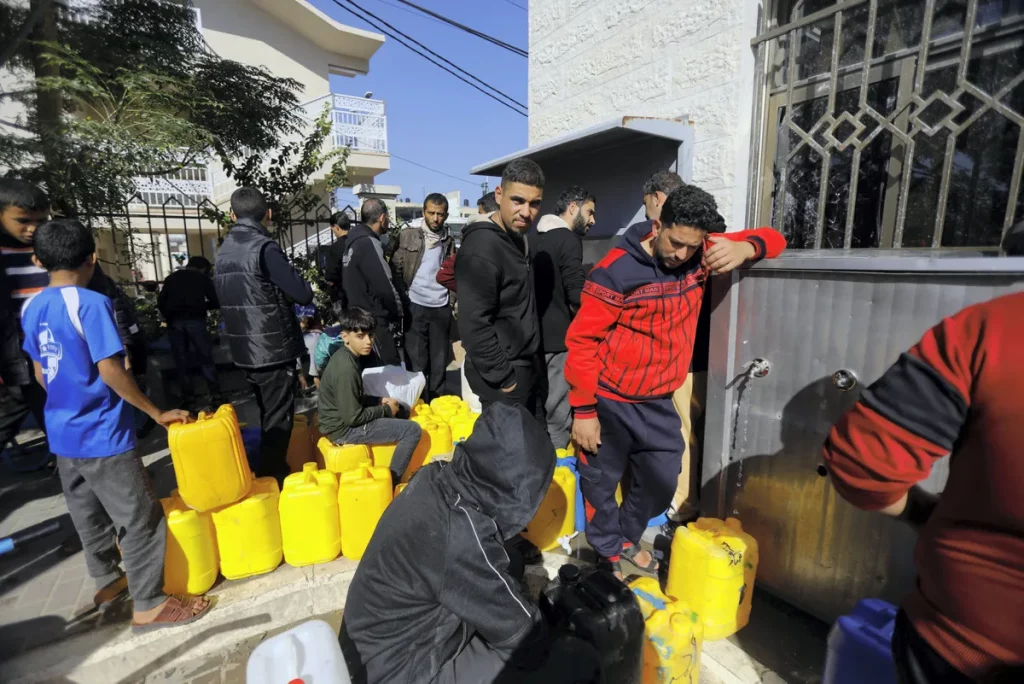Zafrir Rinat Dec 29, 2023
The longer the war in the Gaza Strip rages, the deeper its destruction of Gaza’s infrastructure and environment – and its effects on health. Israeli soldiers in the Strip and Israelis just over the border are also exposed, and the blight may creep farther. Asbestos waste, damage to agriculture and the spread of viruses and bacteria may cause widespread disease in Gaza and beyond.
These risks increase as water and sewage treatment facilities are destroyed and as alarming amounts of waste remain uncollected. This reality requires a response from Israel, but also from international agencies that must act for Gazans currently ruled by an organization more interested in the quality of its tunnels than the quality of life above them. As the war goes on, the risk increases that environmental hazards might be spread by animals as well.
Potential environmental problems created on the Israeli side are already being addressed; the Environmental Protection Ministry presented a plan this week. Waste hazards including asbestos would be removed from damaged buildings; the government plans to address the many locations where agricultural and construction waste have accumulated.
- Israeli gov’t approves construction of new community near Gaza border
- ‘Even before the war, water in Gaza was not enough to shower’
- How solar energy is making settlers in the West Bank even more powerful
An initial budget has already been allocated, and more funds are due later. The government has even more ambitious goals, though it’s doubtful they’ll be fully implemented. The Energy Ministry wants renewable energy to produce the border communities’ electricity. Instead of landfills, the Environmental Protection Ministry is talking about transferring waste to new recycling or power plants.
But Gaza has no government agency to carry out such tasks when the war is over. Even before the fighting, the Strip had only very partial infrastructure for both sewage treatment and waste collection and treatment. Some of this has been damaged, but a military journalist visiting a combat zone reported that the Israeli army realizes the importance of purification facilities, so, during one mission, it made sure not to hit one of the largest of these plants.

After the war, better facilities will be needed for collecting and sorting waste, purifying wastewater and generating electricity. It’s unclear how long it will take to launch such a plan and then finish it, so temporary solutions will be necessary.
The Arava Institute for Environmental Studies can help find some of these solutions. The institute is the academic home for Israeli, Palestinian and Jordanian students, and in recent years it has specialized in harnessing off-grid technologies to help communities with no access to water, sewage or electricity networks. The institute aims to set up a consortium of professionals and nongovernmental organizations to implement its plan in Gaza.
“It’s important to stress that this can be done in cooperation with organizations in Gaza that we have collaborated with,” says Tareq Abu Hamed, the institute’s executive director. “They’re also willing to continue working together.”
In recent years, the Arava Institute has helped establish several water and sewage treatment facilities in the West Bank and Gaza, including a water production facility based on Israeli technology. Another facility treats raw sewage by breaking down its organic components. After this purification process, wastewater can be used for irrigation. There are also solar energy plants; one of these in southern Gaza was severely damaged in an Israeli strike during the war.
The scope of these facilities’ operations can be adjusted for the community they serve. “You can build a facility for one house, a school, or an entire village,” Abu Hamed says. “Depending on the funding, they can be deployed to serve a population of hundreds of thousands of people.”
As soon as possible, the Arava Institute hopes to train engineers, technicians, local authorities and farmers to set up and operate water, energy and sewage services. Israeli organizations’ cooperation with this effort can help bring people together as they address shared needs and shared existential missions.
